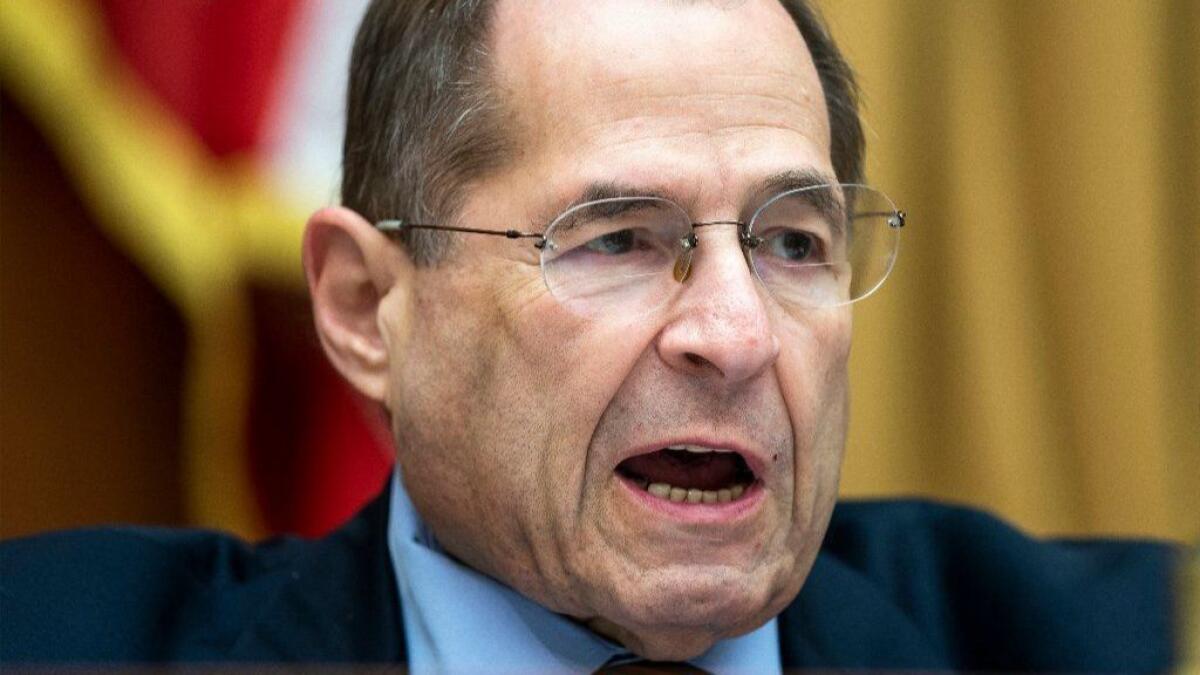Justice Department agrees to hand over underlying evidence from Mueller report

- Share via
Reporting from Washington — House Democrats reached an agreement Monday with the Justice Department to view underlying documents behind the redacted report by special counsel Robert S. Mueller III into Russian meddling in the 2016 election, partially defusing an impasse between Congress and the Trump administration.
The Justice Department will begin providing the Mueller documents to the House Judiciary Committee on Monday and they will be available to all members of the panel, not just senior lawmakers, according to the committee chairman, Rep. Jerrold Nadler (D-N.Y.).
In a statement, Nadler said the Justice Department would “begin complying with our committee’s subpoena by opening Robert Mueller’s most important files to us, providing us with key evidence that the special counsel used to assess whether the president and others obstructed justice or were engaged in other misconduct.”
The House is still expected to move forward with a vote Tuesday to authorize committee chairmen to pursue civil contempt through lawsuits aimed at enforcing subpoenas.
The resolution names Atty. Gen. William Barr, who has resisted until now providing lawmakers with an unredacted copy of Mueller’s final report or the underlying evidence Mueller used, and former White House counsel Donald McGahn, who has defied a subpoena and refused to testify before the Judiciary Committee.
Tuesday’s vote, which is expected to pass, means the committee can pursue lawsuits to enforce its subpoenas without the House having to hold another vote, and Nadler didn’t take that option off the table.
“If the department proceeds in good faith and we are able to obtain everything that we need, then there will be no need to take further steps,” Nadler said. “If important information is held back, then we will have no choice but to enforce our subpoena in court and consider other remedies.”
Republicans said the Justice Department decision shows it is cooperating with congressional oversight.
“Today’s good-faith provision from the administration further debunks claims that the White House is stonewalling Congress,” said Rep. Doug Collins (R-Ga.), the top Republican on the House Judiciary Committee.
The committee has battled Barr for weeks over what underlying information would be released to Congress and how many lawmakers would be able to see it. On May 8, the committee voted to recommend that the House hold Barr in contempt of Congress.
After a 22-month investigation, Mueller’s 448-page report was released to the public in redacted form in mid-April. The Judiciary Committee quickly demanded to see materials that were blacked out because they relied on classified intelligence, grand jury evidence or other protected material.
In his report, Mueller concluded that he had insufficient evidence to prove that officials in the Trump presidential campaign cooperated with a Kremlin-backed operation intended to sway the election, although he said they had welcomed the effort.
Mueller outlined numerous cases where it appeared Trump sought to derail the investigation after he was elected. But Mueller said he did not consider bringing a charge of obstruction of justice because of Justice Department guidelines that bar charging a sitting president with a crime.
In comments at the Justice Department on May 29, the former FBI director made clear that he had not exonerated the president, as Trump often claims.
“If we had had confidence that the president clearly did not commit a crime, we would have said so,” Mueller said. “We did not, however, make a determination as to whether the president did commit a crime.”
Mueller obtained criminal charges against 34 individuals, including Trump’s former national security advisor, his former campaign chairman and his former personal lawyer.
More stories from Sarah D. Wire »
More to Read
Get the L.A. Times Politics newsletter
Deeply reported insights into legislation, politics and policy from Sacramento, Washington and beyond. In your inbox three times per week.
You may occasionally receive promotional content from the Los Angeles Times.











